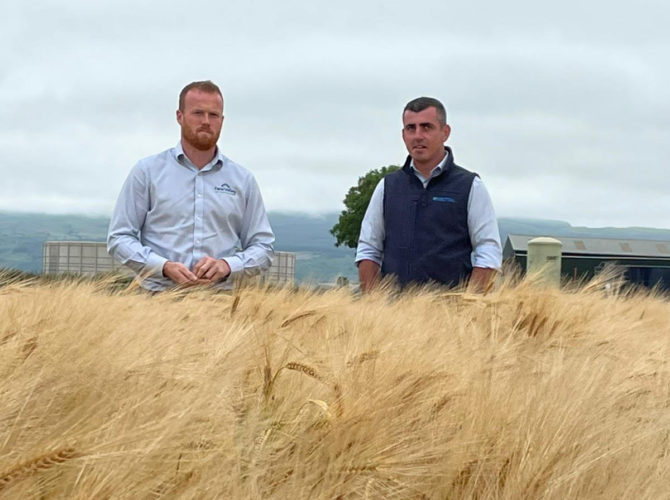Is Growing Grain an option on my Farm?
10th March 2022

With the recent Russian invasion and war in Ukraine, the knock-on effects and ramifications for local agriculture are now being manifested through supply issues and price increases for fertiliser and grain. While farmers have little control over the price of inputs for global commodities, they can take back some control and look at their own farming systems and, ask the question, “Can grain be grown on my farm?”
The answer in most cases is yes. Northern Irelands, soils and climate are very conductive to growing cereals, such as wheat, barley and oats. Local dairy and beef farms have access to organic manures such as slurry and much of the equipment to grow cereals is readily available either on farm or through contractors.
Good yields of grain and straw can be produced locally, generations ago most farms produced grain, for feeding livestock on farm or for sale. With the intensification specialised farms, mixed farms are much less common, we see large scale livestock farms, where only one enterprise is practised, with all grain and straw bought in.
Can I grow grain? Farmers can have a fear factor over doing something different, with the knowledge of older generations no longer on farm, farmers quite rightly have concerns over starting to grow cereals. At Fane Valley, the Agronomy and Forage team are qualified agronomists and are ready to collaborate with you to share knowledge and advice on cereal production and help you to grow cereals successfully.
Homegrown crops present a financial and environmental advantage over bought in concentrates with grain produced on farm at ‘first cost’ coupled with a reduction in the nutrient loading through use of slurry to grow grain helping to keep farms within nitrogen loading limits and environmental regulations.
How much will grain growing cost? This is difficult to answer as every farm and situation is different. Questions such as do I count land cost, machinery cost, labour cost, fertiliser cost etc need answered, however a rough figure will be £300 per acre excluding land cost. With the elevated fertiliser prices, slurry can be used very effectively to replace fertiliser and reduce this cost. On a dairy farm with excess slurry, it is possible to grow Spring Barley with little or no artificial nitrogen, provided the slurry is applied correctly and at the right stages.
What will an acre produce? An acre of land will grow 2-3 tonnes of Spring Barley, with 6-7 round bales per acre of straw. In terms of storage and feeding a multitude of options are possible, including drying, crimping, propionic acid and Maxammon treatment. Key to cereal production as for any enterprise is efficiency and doing things correctly, crops will need looked after with appropriate inputs and timings.
For information on growing grain please contact Fane Valley, Agronomy & Forage team on 028 9261 0485 and a call can be arranged with one of our local Agronomists.

